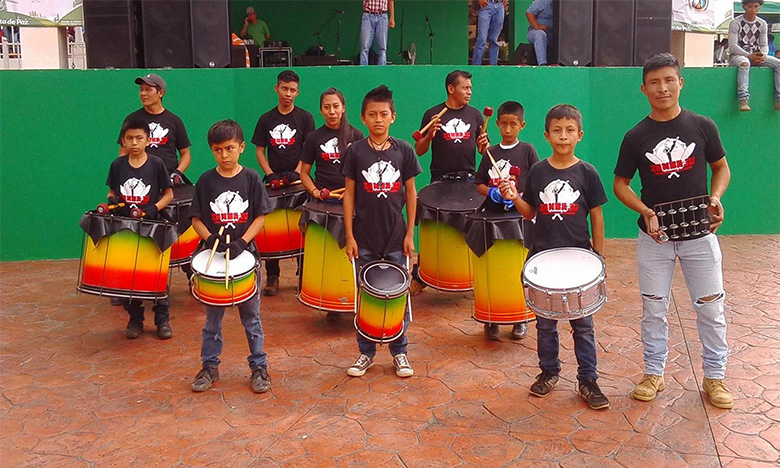At 4 a.m. on a summer morning in San Salvador, teenage boys and girls lugging a strange assortment of drums gather under the haze of street lights. After exchanging greetings, they pack the instruments in two cars and head out of town. For the next four hours, some of the teens sleep, while others can’t stop chatting. When they finally reach the village of El Junquillo in Morazán, a department in eastern El Salvador, they set up the drums and get ready to play the infectiously rhythmic music known as batucada — a turbocharged African-Brazilian offshoot of the samba.
The teens from the capital city call their band Hormiga Roja (“Red Ant”), and today they are performing with a nine-member batucada group called Zanbaju, which throws in stilt walkers, unicycle riders and a juggler to amp up the fun. The bands represent a growing movement in El Salvador — the enlistment of an immensely popular art form to improve the lives of teens and young adults. The musicians earn small amounts of money performing at everything from birthday parties to political rallies and, more importantly, they develop self-confidence and positive options to counter the constant threat of gang recruitment and violence. “We started with the idea of motivating youth,” says Irene Ramirez Garcia, 37, the leader of Zanbaju, “so that one day they will know what they want to do in life and contribute to the community.”
"THERE ARE BOYS WITH GUNS, AND THERE ARE BOYS WITH DRUMS."
Corruption, violence and youth gangs in this small Central American country of 6.5 million people are so pervasive that 40 percent of Salvadorans want to emigrate, according to a survey published in January by the Institute of Public Opinion at San Salvador’s José Simeón Cañas Central American University. And no wonder: The murder rate averages more than 14 homicides per day, with more than 50 percent of the victims between the ages of 15 and 29. That’s the batucada demographic.
The origins of the percussion style in Central America are not easy to trace: Some experts claim that donations from U.S. foundations and other aid groups helped teens purchase the drums; others say that visiting musicians from Chile introduced the drums to the youth of El Salvador. The foreign donations were essential in a country where the average monthly income in urban areas is $660. A typical kit can cost up to $500 and include a repinique (tom-tom), surdo (bass), caixa de guerra (snare), the conical timbal and many other percussion instruments.
There is no official figure on the number of batucada groups in El Salvador, but — improbably — a former exchange student from Austria has established a national organization called Red de Batucadas TuYulu, which counts 20 bands in its membership. When Jonas Schwarz, 27, saw how batucada could be a political force, he partnered with Victoria Eugenia Ventura Guadron, 27, to give the collective efforts of batucada a political intent. For participants up to age 15, TuYulu workshops teach the importance of community in a society ravaged by gang violence. Older musicians learn about basic human and indigenous rights. (In the indigenous Nahuatl language, “tu” means “our” and “yulu” means “heart.”)
Schwarz also believes that older batucada performers can become positive role models for younger musicians in a country where violence, high rates of emigration and parents working multiple jobs have fractured families. “There are boys with guns, and there are boys with drums,” Schwarz says. “Both instruments offer the youth communion in the absence of a rooted family structure. But among batucada groups, the youths learn to respect themselves and one another and become a support mechanism during times of crisis.”
TuYulu courses on gender equality have made older male participants aware of the lack of opportunities for Salvadoran women in all fields, including batucada, where their role often has been limited to dancing. When Guadron first got involved, in 2010, most bands didn’t allow women to play instruments, so she helped form the country’s first all-women group, Las Musas. “We had no drums, so we used large pots and water barrels,” she recalls. “When we earned some money from performances, we bought real drums.” After three years, Guadron had to give up the band to prep for her university finals. These days, though, with batucada considered cool, girls fight with their families to get permission to join male friends in a band.
Carlos Odria, 41, a performing arts professor at UMass Boston, has researched the rise of batucada as a grassroots movement in his native Peru. One group, Kilombo, has 100 members. For many students who are unable to access formal education, batucada is the only avenue for learning, Odria says. Practicing the drums on streets also offers the cloak of protection: The musicians are not seen as threats. “Former gang members have joined batucada,” Odria says. “When they see a youth like themselves — similar age, same background — playing in a group and having fun, they wonder, ‘If he can play it, then why not me?’ That’s transformative.” Odria says that batucada is now a “rite of passage” in Peru.
Back in embattled El Salvador, Red de Batucadas TuYulu is sustaining itself with funds from the Salvadoran government and organizations in Austria and Switzerland. When the network organized its first national encuentero (meeting) in 2015, it issued a statement to the local media that violence and lost youth do not alone define El Salvador. “That evening,” says Schwarz, “some people told me that our press conference was the only positive thing in the news.”

